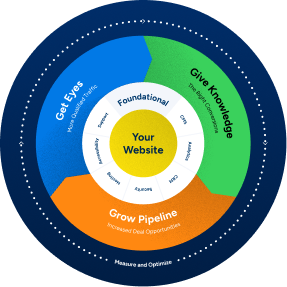Brand equity isn’t just a buzzword being thrown around by clever marketers in charge of creating an innovative B2B brand strategy. It’s actually much more important than many B2B business owners realize. As a result, they don’t tap into what it offers and don’t reap the many rewards.
But you’re here, and that means you have an idea about the value of brand equity and want to know more.
In this article, we’ll take a closer look at what this entails and discuss the seven most important facets that make it so essential for brand strategies.
What Is Brand Equity?
To define brand equity in just a few words, it is the value of a brand based on consumer perception. Although that sounds simple enough, there is much more to it, and if you want to create a B2B brand strategy that truly reaps rewards, you need to understand the value of brand equity.
When a brand becomes recognizable and consumers trust it, the company behind it has gained good brand equity. By making sure your brand is memorable and offers more quality than your competition, you can improve your brand’s equity.
Being reliable and ensuring your target audience prefers you over other brands will make your brand equity good enough to be powerful and something to be proud of.
Basically, what it comes down to is brand equity is present when you make you finding trust and recognition.
Now, let’s look at the seven things you should know about the power of brand equity.
It Has an Effect on Profit Margins
When you manage to reach a high level of brand equity, your consumers will perceive your brand’s products as being more reliable and valuable. This results in consumers preferring your brand, and that has a massive impact on your sales and profit margins.
People will be willing to pay more for your products and you’ll make more money.
Take Apple, for example. When this technology company releases a new product, people line up around the block to get their hands on it, even when they don’t know how well it works or whether it’s worth the money they’ll spend on it.
A lesser-known brand will have to prove that its products are worthy before people line up for it. In this scenario, Apple has superior brand equity and enjoys higher profit margins.
Good Brand Equity Lets You Charge a Price Premium
Brand equity has many benefits, and one of the biggest (and arguably best) advantages has to be the ability to increase your prices. You can charge a price premium, also referred to as relative price, which is when consumers are willing to pay more for your product than they’d pay for a similar product offered by your competition.
As a result, you can increase your prices without losing your consumers. This can also improve your brand’s reputation, making it stand out as superior and worth more than anything else on the market.
You Can Extend Your Product Line
If you manage to improve your brand equity, you can extend your product line with more ease. Your customers will be more likely to try new products if they’ve come to trust your brand and know they’re getting their money’s worth.
In fact, your consumers might even start asking you to launch new product lines with new features that they want in your product.
Brand Equity Should Be Tracked in Detail
Measuring your brand equity can take a lot of work and dedication. There are three elements you need to track to get a good understanding of your brand equity power. You must track your consumer, strength, and financial metrics.
Consumer Metrics
Companies know that customers determine the success of brands, and consumer purchase behavior can indicate how they feel about your brand. When you track your brand perception and brand relevance, you’ll get a clearer idea of how powerful your brand equity is.
Strength Metrics
A strong brand is more likely to survive even in the most turbulent times, and you can measure your company’s strength by looking at brand awareness and customer loyalty. The data you gain from looking at these metrics will let you better understand your brand equity.
Financial Metrics
You will be able to determine from your company’s growth rate, revenue, customer retention costs, profitability, and market share just how financially strong your brand equity is.
It Impacts Return on Investment (ROI)
Your brand equity has an effect on your ROI, so it’s important to give it attention for more reasons than improved profit. If you have a good reputation as a reliable and high-quality brand, you won’t have to spend as much money on advertising. The money you do spend will result in high returns.
On the other hand, without good brand equity, you’ll have to spend more on marketing, and the ROI may not be as high.
Authenticity Is Essential
Building brand equity requires a company to remain authentic, even after becoming more popular and growing beyond expectations. If your consumers feel that you’re no longer the brand you were at the beginning or that you’re no longer authentic, you will lose their support.
Change is inevitable, but you must remain true to your brand’s core values. Using comprehensive brand guidelines can help you with this.
Brand Equity Gives You Negotiating Power
When you have high brand equity, you have more of an advantage when you need to negotiate with manufacturers, distributors, and vendors. Your suppliers will also be much more enthusiastic about working with you and this can result in easier negotiation for discounts or special offers.
How to Create Brand Equity
This can’t be built overnight and it will take a lot of work to get yours to be powerful and beneficial. Here are a few tips on how you can create a B2B brand strategy that will create overall improvement:
Improve Your Company’s Positioning With Your Consumers
Make sure you’re targeting your target audience’s pain points. Are you offering them a service or product they need and want in their lives? Make your brand irreplaceable and it will grow.
Focus on Awareness
Your brand awareness determines how popular you are, and this affects your brand equity. Make sure your marketing strategies are aimed at brand awareness and getting people to notice you.
Be Consistent
One of the most important tips we can give is that you should be consistent. This applies to all aspects of your B2B brand strategy. Consistency breeds trust and improves how people see your brand.
Talk to GoingClear About These Important Elements
As you now know, there are many important elements of running a successful business. It can be challenging to find the best ways to ensure that your brand equity is reaching peak levels, but GoingClear can help. Our team of experts in marketing and strategic thinking wants to assist you, so call us today for more information!

